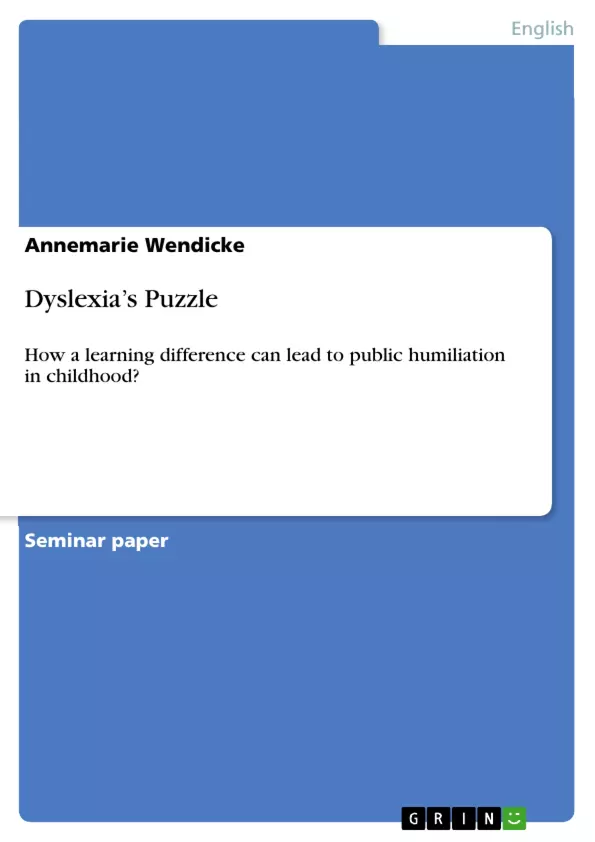Learning is a life-long process and everybody knows that it is often very painful and difficult. Teachers are supposed to meet the individual needs of the students, to help him/her to gain insight into the academic world and to succeed in school. It is often difficult for teachers to fulfill these tasks but it can become even more difficult if there are other factors that play a significant role in the learning process such as a learning disability called dyslexia. Nowadays there are a lot of children, who get the diagnosis dyslexia, and they are still treated the same way as children without a learning disability.
It is often difficult for parents to accept the fact that their child might be dyslexic because they know how problematic the life of the whole family can become. These children have almost no chance to have a positive experience related to reading in school as a lot of teachers are still unfamiliar with teaching techniques that are appropriate for dyslexic children. Jackie Stewart, a Scottish race driver, who won 27 Grand Prix titles and has dyslexia, said once: “You will never understand what it feels like to be dyslexic. No matter how long you have worked in this area, no matter if your own children are dyslexic, you will never understand what it feels like to be humiliated your entire childhood and taught every day to believe that you will never succeed at anything.” (Wolf, 2008, p. 166) Society has to accept that idea that there are dyslexic children, whose needs are different from the ones of normal children. Teachers should use teaching techniques for dyslexic children in school such as multisensory instruction, phonemic awareness, and promote the idea of home schooling, as they would not influence normal students in a negative way. Consequently, dyslexic children as well as normal children would have a good chance to be successful.
Inhaltsverzeichnis (Table of Contents)
- Introduction
- Discussion
- The results of Rita Rudel's study on the ability to name object or colors clearly
- As everyone knows, children have to go to school in order to get an education.
- A lot of children make negative experience regarding the learning process every day.
Zielsetzung und Themenschwerpunkte (Objectives and Key Themes)
This text explores the challenges faced by children with dyslexia within the traditional educational system. It aims to shed light on the impact of dyslexia on learning and social experiences, highlighting the need for specialized teaching methods and a greater understanding of this learning difference.
- Dyslexia as a Learning Difference
- The Impact of Dyslexia on Social and Academic Success
- The Role of Teaching Techniques for Dyslexic Children
- The Importance of Early Identification and Support
- The Societal and Educational Challenges Related to Dyslexia
Zusammenfassung der Kapitel (Chapter Summaries)
- Introduction: This chapter introduces the concept of dyslexia as a learning difference that often leads to humiliation and difficulties in traditional educational settings. It emphasizes the need for specialized teaching techniques and a more inclusive approach to education.
- Discussion: This chapter provides a deeper understanding of dyslexia, highlighting its neurological origins and its impact on reading and language processing. It explores differing perspectives on dyslexia, including its potential connection to creativity and the importance of early identification.
- The results of Rita Rudel's study on the ability to name object or colors clearly: This section delves into the research findings of Rita Rudel, highlighting the differences in brain function between dyslexic and non-dyslexic children. It focuses on the difficulties dyslexic children face in retrieving names of letters and objects.
- As everyone knows, children have to go to school in order to get an education.: This chapter discusses the challenges faced by dyslexic children in traditional educational settings, highlighting the lack of adequate resources and training for teachers. It explores the potential for negative experiences and the need for inclusive practices.
Schlüsselwörter (Keywords)
Dyslexia, learning difference, educational challenges, teaching techniques, neurological origins, reading difficulties, social stigma, early intervention, inclusive education, multisensory instruction, phoneme awareness, creativity.
Frequently Asked Questions
What is dyslexia?
Dyslexia is a learning difference of neurological origin that primarily affects reading, language processing, and the ability to retrieve names of letters or objects.
What are the recommended teaching techniques for dyslexic children?
Effective techniques include multisensory instruction, phonemic awareness training, and individualized support tailored to the child's specific needs.
How does dyslexia impact a child's social experience in school?
Children with dyslexia often face humiliation and negative experiences in traditional settings, which can lead to low self-esteem and a belief that they will never succeed.
What did Rita Rudel's study contribute to dyslexia research?
Her research highlighted differences in brain function, specifically focusing on the difficulties dyslexic children have in naming objects or colors clearly compared to non-dyslexic children.
Why is early identification of dyslexia important?
Early identification allows for timely intervention and the implementation of inclusive practices, giving the child a better chance at academic and personal success.
- Citation du texte
- Annemarie Wendicke (Auteur), 2008, Dyslexia’s Puzzle, Munich, GRIN Verlag, https://www.grin.com/document/135543



